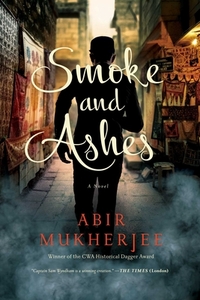Take a photo of a barcode or cover
An entertaining thriller set against the backdrop of increasing tensions in India as the desire for independence increases. Mukherjee has taken some artistic licence on actual dates, but many of the key events mentioned in the book are real. I’ve got a soft spot for the flawed Captain Wyndham, and am a little in love with Sargeant Surendranath “Surrender-not” Banerjee.
Pretty average book in what has been a good series of books so far. Great historical basis in 1920 India concerning visit by Prince Edward, Prince of Wales at the time. Maybe not quite as much action, nor quite as much mystery, nor quite as much clever interplay between Sam and Surrender-Not as prior books, but still worth the read, which did seem to take awhile to read, which never helps for a book's rating.
I bought this book a few years ago and then realized it was the third in a series. The writing, as always, is strong with good pacing. The plot was interesting (though I suppressed a wince at some technical inaccuracies), and though I figured out where Mukherjee was taking me there were still some surprises to be had. Surrender-not is my favorite character in this series, and I wish there was a way to bring more of him out in the series--but realize that would be difficult using the first-person narrative of Sam.
First there was A Rising Man and then A Necessary Evil and akin to the sound of an angelic host the very words, “There’s a new Abir Mukherjee book out now” made my heart soar with an excitement rarely achieved, since I won a handwriting competition at the age of 10 on holiday on the Isle of Wight i.e very excited indeed. And so we are catapulted back to the inglorious days of the Raj, and to be honest, it would unwise to even countenance the thought that our dynamic duo would be experiencing anything like a straightforward investigation. There is some serious trouble afoot…
It is so gratifying to reach the third book in a series and for it to feel as fresh and vibrant as the first two. Partly, I would put this down to the developing working relationship, and growing friendship of our chalk and cheese partnership of Sam and Surrender-not, and the sheer level of engagement Mukherjee creates with the reader in how he presents the social and political unrest of this turbulent period of Indian history. With the former, I would say that each time we encounter these wonderful characters, there is always a little stretch of unchartered territory between them, little pieces of which Mukherjee brings to the narrative, giving us a different perspective of them as each investigation develops. This book is no different with Sam’s largely deniable opium habit leading to all manner of trouble, and becoming an increasingly large elephant in the room in his relationship with Surrender-Not. Equally, Surrender-not’s personal connection to some prominent political enemies of the Raj, reveals a whole new side to his character, and the very personal toll it has on him, trying to make his way in a career that puts him at odds with his family and fellow citizens. Mukherjee captures perfectly their points of similarity, as much as their points of difference, and how at the crux of their working relationship, these points of separation or conflict actually lead them to be an extremely effective working partnership. This unity of purpose becomes especially evident when pitted against other representatives of law, order and security, and some thorny encounters ensue, and, needless to say when violence comes a-knocking you can guarantee Sam will be in the way. Although, this investigation is markedly more emotive and darker in tone than the previous books, there is still time for the badinage, and affectionate leg pulling that Mukherjee affords his detecting double act, as well as to those they encounter along the way, which is, as always, entertaining.
With the war for Indian independence raging on, and the upcoming visit of the Prince of Wales, there is a tinderbox atmosphere in Calcutta, and Mukherjee completely immerses the reader in the stifling heat, social unrest, and the simmering violence that regularly explodes. Peppered with figures in the fight for independence, and their differing attitudes in how to achieve this aim of liberation from suffocating British rule, the book positively throbs with suppressed and overt rebellion, from the average citizen on the street, to those who would keep order, to those who seek to overturn the status quo, and the increasingly less confident smug satisfaction of the British themselves. All this tension and turbulence is delivered in a measured, informative and entertaining style, underscored by the sights and sounds of the city streets, and the building heat, both meteorological and political, sucking you in and ramping up the tension to the nth degree. Brilliant.
I think this just proves, if further proof were needed, that this is a remarkably good book in a remarkably good series, and I cannot find a bad word to say about it.
Which is lovely.
And why you should all seek out these books for yourselves.
Which would be lovely too.
It is so gratifying to reach the third book in a series and for it to feel as fresh and vibrant as the first two. Partly, I would put this down to the developing working relationship, and growing friendship of our chalk and cheese partnership of Sam and Surrender-not, and the sheer level of engagement Mukherjee creates with the reader in how he presents the social and political unrest of this turbulent period of Indian history. With the former, I would say that each time we encounter these wonderful characters, there is always a little stretch of unchartered territory between them, little pieces of which Mukherjee brings to the narrative, giving us a different perspective of them as each investigation develops. This book is no different with Sam’s largely deniable opium habit leading to all manner of trouble, and becoming an increasingly large elephant in the room in his relationship with Surrender-Not. Equally, Surrender-not’s personal connection to some prominent political enemies of the Raj, reveals a whole new side to his character, and the very personal toll it has on him, trying to make his way in a career that puts him at odds with his family and fellow citizens. Mukherjee captures perfectly their points of similarity, as much as their points of difference, and how at the crux of their working relationship, these points of separation or conflict actually lead them to be an extremely effective working partnership. This unity of purpose becomes especially evident when pitted against other representatives of law, order and security, and some thorny encounters ensue, and, needless to say when violence comes a-knocking you can guarantee Sam will be in the way. Although, this investigation is markedly more emotive and darker in tone than the previous books, there is still time for the badinage, and affectionate leg pulling that Mukherjee affords his detecting double act, as well as to those they encounter along the way, which is, as always, entertaining.
With the war for Indian independence raging on, and the upcoming visit of the Prince of Wales, there is a tinderbox atmosphere in Calcutta, and Mukherjee completely immerses the reader in the stifling heat, social unrest, and the simmering violence that regularly explodes. Peppered with figures in the fight for independence, and their differing attitudes in how to achieve this aim of liberation from suffocating British rule, the book positively throbs with suppressed and overt rebellion, from the average citizen on the street, to those who would keep order, to those who seek to overturn the status quo, and the increasingly less confident smug satisfaction of the British themselves. All this tension and turbulence is delivered in a measured, informative and entertaining style, underscored by the sights and sounds of the city streets, and the building heat, both meteorological and political, sucking you in and ramping up the tension to the nth degree. Brilliant.
I think this just proves, if further proof were needed, that this is a remarkably good book in a remarkably good series, and I cannot find a bad word to say about it.
Which is lovely.
And why you should all seek out these books for yourselves.
Which would be lovely too.
adventurous
dark
informative
mysterious
tense
medium-paced
Plot or Character Driven:
A mix
Strong character development:
Yes
Loveable characters:
Complicated
Diverse cast of characters:
Yes
Flaws of characters a main focus:
Complicated
adventurous
dark
hopeful
mysterious
tense
fast-paced
Plot or Character Driven:
A mix
Strong character development:
Yes
Loveable characters:
Yes
Diverse cast of characters:
Yes
Flaws of characters a main focus:
Yes
adventurous
informative
mysterious
tense
medium-paced
Plot or Character Driven:
A mix
Strong character development:
Yes
Loveable characters:
Yes
Diverse cast of characters:
Yes
Flaws of characters a main focus:
Yes
“Smoke and Ashes” is the third book in Mukherjee’s “Wyndham & Banerjee” historical crime fiction series, and it’s every bit as captivating as the earlier books. The author’s intimate knowledge of the city and its complex history is evident throughout, making the narrative both dynamic and authentic.
Mukherjee skillfully blends historical accuracy with a fast-paced, engaging plot that keeps the reader hooked from start to finish. The story offers a balanced portrayal of India under British rule, impartially highlighting both the strengths and flaws of the era. What makes this installment particularly intriguing is its foundation in real historical events. This fusion of truth and fiction is both unsettling and fascinating, adding depth to the mystery and ensuring the reader’s interest never wanes.
As someone who typically isn’t drawn to history, I’ve been captivated by learning about Anglo-Indian history through this series. It has sparked a new interest in me, and I’ve already begun exploring additional reading on the subject.
Mukherjee skillfully blends historical accuracy with a fast-paced, engaging plot that keeps the reader hooked from start to finish. The story offers a balanced portrayal of India under British rule, impartially highlighting both the strengths and flaws of the era. What makes this installment particularly intriguing is its foundation in real historical events. This fusion of truth and fiction is both unsettling and fascinating, adding depth to the mystery and ensuring the reader’s interest never wanes.
As someone who typically isn’t drawn to history, I’ve been captivated by learning about Anglo-Indian history through this series. It has sparked a new interest in me, and I’ve already begun exploring additional reading on the subject.
Not sure about this one.... a bit too gung ho and a bit over dramatic. It did get a tad wearying when two different police forces don’t get on it just felt too much.





